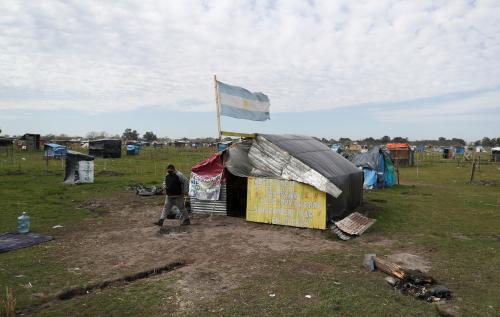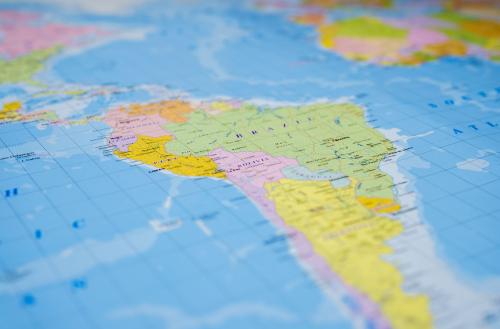This op-ed was originally published by Project Syndicate.
The recession that Latin America is now confronting as a result of the COVID-19 pandemic is not a typical economic slump. This year, output across the region will be 10 percent lower than was forecast in late 2019, joblessness is in double digits, and nearly 15 million more people will now have to endure extreme poverty. Two decades of progress in reducing poverty and inequality are at risk. With living standards collapsing, the wave of social unrest experienced before the pandemic is likely to return.
During the initial phase of the COVID-19 crisis, most governments in the region made the preservation of lives and livelihoods their main priority. They plowed resources into the health sector, provided subsidies to businesses, and supplied households with emergency cash transfers. This was the correct approach, but, as economies gradually began to reopen, a shift in policies became necessary. Moving from economic preservation to recovery will bring new challenges.
The pandemic has highlighted two long-standing structural weaknesses in Latin America. The first is pervasive and chronic shortcomings in state capacity. It was not just a lack of fiscal resources, but also the lack of effectiveness in providing government support, that led to the sharp increase in the COVID-19 death toll across the region. Even today, classes and school activities remain suspended in many countries due to unresolved logistical problems. It is easy to imagine what will happen once a vaccine is available: Latin America will lag in the challenge of vaccinating the population at an adequate pace.
The second structural weakness is the dual labor market typical of the region: a minority of insiders who work in stable salaried jobs with access to traditional benefits (paid leave, unemployment insurance, severance pay), and a majority of outsiders who work in precarious, low-wage, high-turnover jobs. During lockdowns, insiders enjoyed job support and furlough schemes, while outsiders depended entirely on cash transfers from governments that compensated them for a mere fraction of their lost income.
This crisis is the region’s greatest opportunity in decades to strengthen state capacity and correct the dysfunction of the labor market. But the necessary changes are politically difficult. The risk is that the region will move in the opposite direction, with a looming fiscal crisis, a slow recovery, and a permanent destruction of “good” jobs that would deepen dualism in the labor market.
Latin America has confronted the macro-financial shock of the pandemic reasonably well. Despite the early capital flight that weakened local currencies, the region has avoided financial collapse and most countries have retained access to international financial markets. Even those in sovereign default, like Argentina and Ecuador, were able to negotiate debt exchanges with unexpected speed.
But the pandemic has been devastating for the real economy: countless businesses, big and small, have run out of cash and been forced to shut down permanently. As firms go under and whole sectors need to be restructured, potential output growth will suffer. This will make it more difficult to reverse the increase in unemployment, poverty, and inequality—and will render the job of balancing fiscal accounts and stabilizing public debt unmanageable.
Unconventional monetary policy is useful but will be insufficient to guarantee a recovery. Countries in the region require surgically precise plans that not only boost demand, but also help relax key supply restrictions and mitigate firms’ financial stress. At the same time, support for workers must be designed to encourage formal employment, and governments should invest in health, education, and infrastructure to help firms and households adapt to the new normal. Public-private collaboration and stable industrial relations will be essential: A healthy recovery is a cooperative game.
The ultimate challenge, as ever, is political. Several Latin American countries have paid a steep price for the populist posturing that dismissed scientific evidence and minimized the threat posed by the virus. These are serious times; they require serious leaders.
Yet national and regional leadership is scarce in fragmented Latin America. To borrow a description by Spanish philosopher José Ortega y Gasset, the region is “invertebrate,” with countries moving in their own directions without much consideration for the rest.
The pandemic has given Latin Americans a harsh reminder of the costs of allowing states to be ineffective and labor markets to remain unfairly segmented. It has deepened old inequalities and created new ones. Infrastructure investment remains weak, and export diversification insufficient.
On these fronts and others, inaction is not an option. Latin America cannot afford another lost decade. As the region begins a new electoral cycle—and after listening to voters instead of lecturing them—political candidates should agree on some core principles for reform. This is a crisis that the region must not let go to waste.
The Brookings Institution is committed to quality, independence, and impact.
We are supported by a diverse array of funders. In line with our values and policies, each Brookings publication represents the sole views of its author(s).









Commentary
Op-edThe COVID reset Latin America needs
November 12, 2020